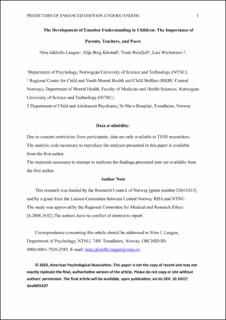| dc.contributor.author | Laugen, Nina Jakhelln | |
| dc.contributor.author | Berg Kårstad, Silja | |
| dc.contributor.author | Reinfjell, Trude | |
| dc.contributor.author | Wichstrøm, Lars | |
| dc.date.accessioned | 2023-11-15T12:39:49Z | |
| dc.date.available | 2023-11-15T12:39:49Z | |
| dc.date.created | 2023-08-16T21:04:42Z | |
| dc.date.issued | 2023 | |
| dc.identifier.issn | 0012-1649 | |
| dc.identifier.uri | https://hdl.handle.net/11250/3102740 | |
| dc.description.abstract | Emotion understanding (EU) develops through emotion socialization provided by children’s social environments, but the relative importance of various socializing agents has not been determined. In this prospective study, the unique contributions of parents, teachers, and peers to changes in EU from 4 to 8 years of age were therefore investigated in a birth cohort sample of 924 Norwegian children (50.1% boys). A warm parent–child relationship at 4 years of age predicted increased EU at 6 years of age but not from 6 to 8 years of age. A close teacher–child relationship forecasted enhanced EU at both 6 and 8 years of age. The results are in accordance with previous research on parents’ roles and bring new knowledge by underscoring the importance of teachers in children’s development of EU. (PsycInfo Database Record (c) 2023 APA, all rights reserved) | en_US |
| dc.language.iso | eng | en_US |
| dc.publisher | American Psychological Association (APA) | en_US |
| dc.title | The Development of Emotion Understanding in Children: The Importance of Parents, Teachers, and Peers | en_US |
| dc.title.alternative | The Development of Emotion Understanding in Children: The Importance of Parents, Teachers, and Peers | en_US |
| dc.type | Journal article | en_US |
| dc.description.version | submittedVersion | en_US |
| dc.source.journal | Developmental Psychology | en_US |
| dc.identifier.doi | 10.1037/dev0001627 | |
| dc.identifier.cristin | 2167508 | |
| cristin.ispublished | true | |
| cristin.fulltext | preprint | |
| cristin.qualitycode | 2 | |
